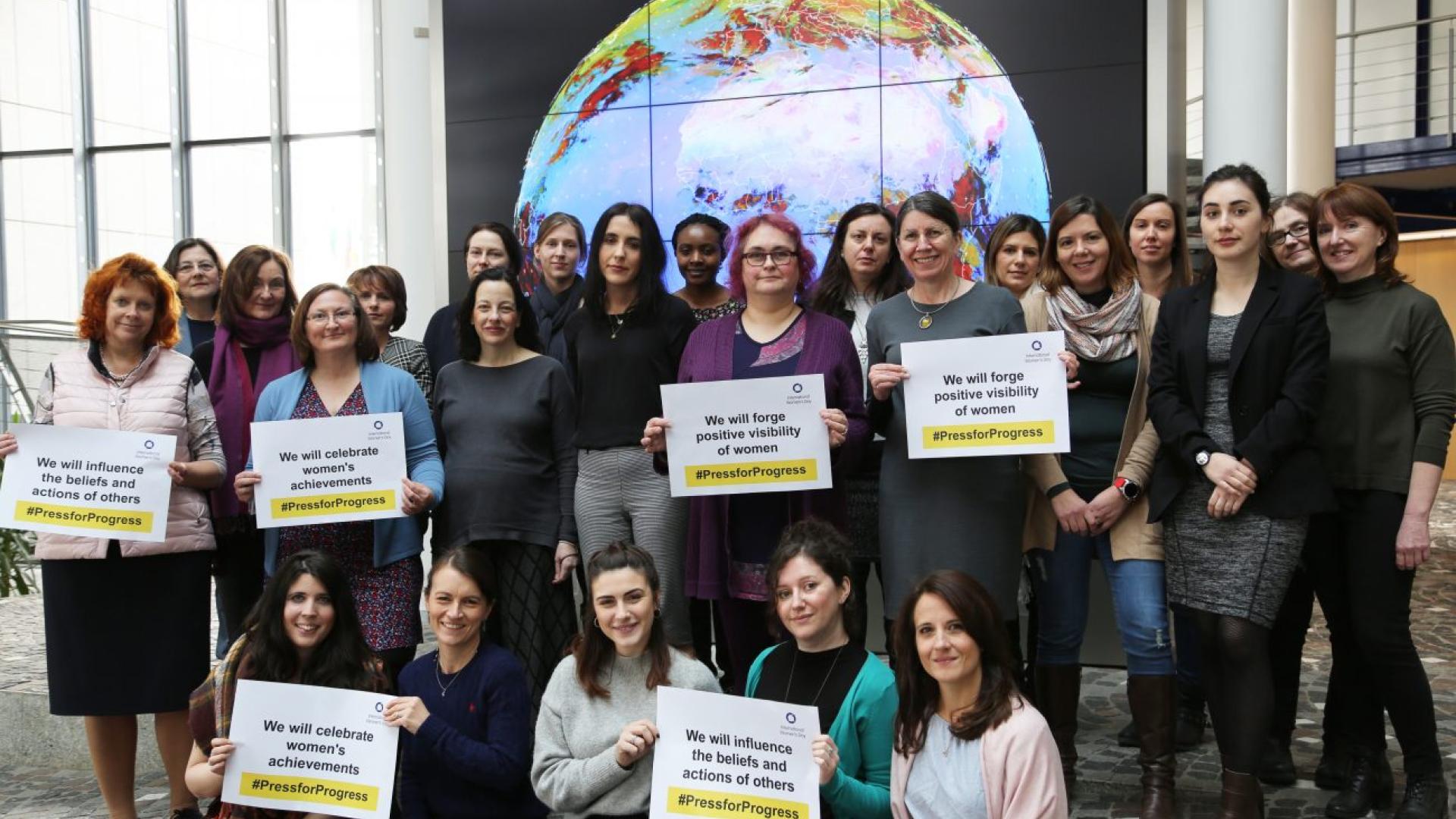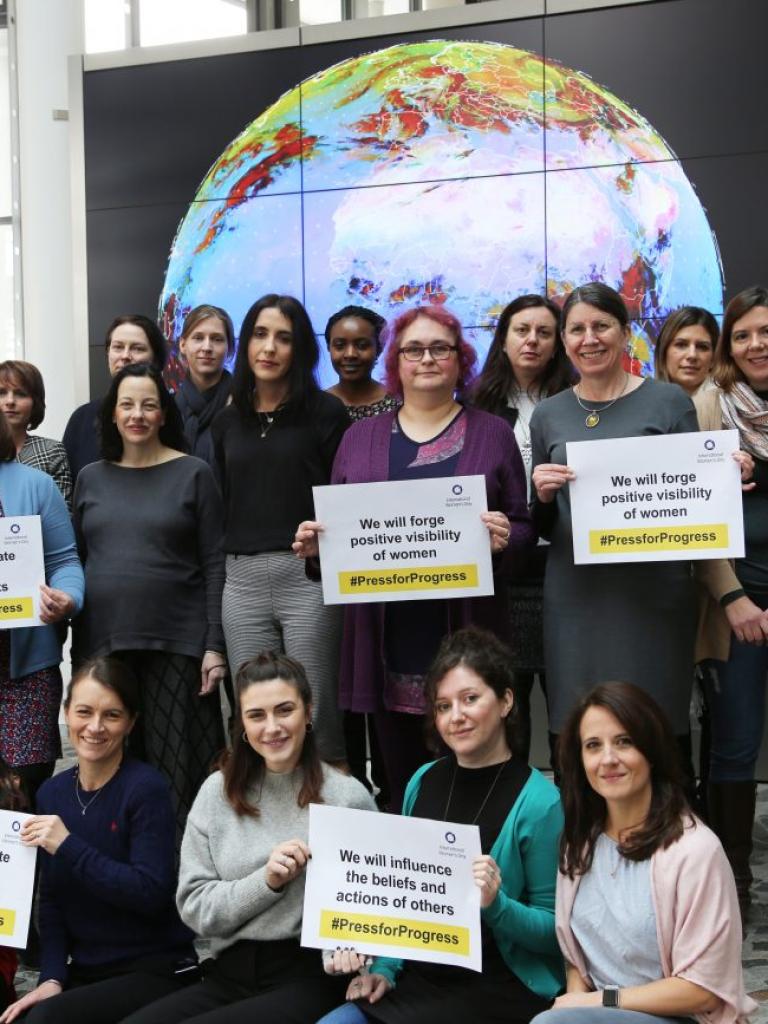Celebrating International Women’s Day with a special Inside EUMETSAT edition!
To coincide with this year’s International Women’s Day (IWD) on 8 March, our Inside EUMETSAT episode will be a little different this time.

We bring you some words from Women in Science and Engineering, and those pursuing their professional passion at EUMETSAT.


12 March 2021
08 March 2018
They include internationally recognised scientists, the EUMETSAT Sentinel-3 Mission Manager, the organisation’s first female Director, the Head of the Contracts Division and a Quality Management Officer.
Despite their different professional backgrounds, nationalities and opinions, there is one belief they all share when it comes to advising young women and girls interested in working in what is perceived as a male-dominated sector. Follow your passion!
“My childhood dream was to work as a scientist in some special facility on an extremely unique project that would impact the whole of society and support our planet,” Ewa said. “With time, I learnt to more and more appreciate the importance of what we are doing here. We are observing our planet. We are learning about it. We are learning the importance of physical and biological processes on our planet. And through this, we hopefully will drive towards preserving the beauty of this planet for all of the living organisms here – including us.”
“I always wanted to do something in environmental science and meteorology from a very young age and got quite into the marine side about 20 years ago,” Anne said. “You feel like you are contributing to the health of the planet and helping governments make decisions to steer things in the right direction. You feel like we are doing something worthwhile – that’s what drew me in the first place.”
Carmen says she came to EUMETSAT more or less by chance after starting out on her career in the international relations field. “I want to continue in this field – I really enjoy it,” she said. “It’s really about contributing to the continuous improvement of an organisation but also of yourself. You can always continue to learn and grow with an organisation.”
Anne: “I don’t think women’s achievements are celebrated by society and I think that’s for a number of reasons. I still think a male-dominated society doesn’t allow women’s contributions to be celebrated and women could be a bit more modest.”
Ewa: “In my career, I’ve encountered many very strong, resolved women and I came to admire them. But not everybody, not every woman, has a strong personality. One just needs interest and resolve. That is important. Just like what you do.”
Hilary pointed out that, although a minority, women have been working in the space industry for many years and making important contributions. Despite that, the perception that space is still a male bastion persists.
“It’s often said that ‘you can’t be what you can’t see’,” Hilary said.
However, now we are seeing more women entering into the science and engineering fields.

Anne (physics/meteorology) and Ewa (applied mathematics) said they were both part of a minority of women studying in those fields when they were at university but they say more women are now entering sciences, particularly environmental sciences.
For Carmen, that this is perceived as a male-dominated field was not an issue that influenced her career choice.
An anecdote Hilary tells illustrates the changing scene. Her grandmother, very unusually for a woman in the 1920s, was able to study at university and, because her course was partly funded by the government, had to agree to teach for five years after graduating. However, she would have been required to give up her job if she married, so she waited five years to do so. Hilary’s mother also studied at university. When she entered the workforce, she was still asked whether she intended to give up her job when she became pregnant.
Hilary says no one would “dare” to ask her or another woman those same questions now. “This change has occurred in only two generations,” she said. “I have hopes going forward that people will see that women can, and are, doing these jobs and doing them well.”
Silvia says that when EUMETSAT has a vacancy, she is 100 percent confident that there is no discrimination against women in the recruitment process. She believes, however, that problems arise before that point – that women are more drawn to careers other than those in technology and engineering, despite the personal and professional rewards the jobs bring.
“Girls seem to be less motivated by the subject,” she said. “Young female engineers tend to come from southern European countries – Italy, Spain and France. What are those countries doing better when it comes to science and engineering?”
Most of the women interviewed for this story told of how their studies or career aspirations changed course before they found themselves working at EUMETSAT in their current positions.
Willingness to be open to new challenges and to recognise that changing course can bring real opportunities was a constant theme.
“Recently, I had some discussions with some younger women just on the verge of joining the field and they were a little bit confused and seemed to be worried that they are a little bit stuck, that they were just following one path defined by their initial education,” Ewa said. “My recommendation was that, in life, you need to investigate and find the subjects you are passionate about and it may not happen right away. It might take you away from what you originally set out to do but it’s definitely worth pursuing.”
Eleni says her advice to other women is to be confident.

“Voice what you have to say and deliver and do your work,” she said. “I definitely see positives, that society is becoming more equal, and I really believe that for people in their early 30s, working in a field perceived as male-dominated is not a career impeding-factor anymore.”
Silvia said that, when she first took on the role of Director, female colleagues welcomed the appointment but asked whether she really wanted to take on such a challenge.
“I didn’t die!” she said. “It’s cope-able. I didn’t set out to be a role model but I am conscious that when you have a Director who happens to be a woman, and there is only one female Director, people think, ‘women managers behave like that’. It is more difficult to differentiate individual style from a potential “gender-generic” style when there is only one or very few women at the top. That is always a bit tricky.”
One area where there was less agreement was on the issue of positive discrimination in favour of women, in order to “balance out” imbalances.
While Silvia found positive discrimination potentially problematic, Hilary said she has come to believe it is necessary.
“The biggest problem is that there is still such a disparity,” Hilary said. “The perception that this is not a career for women is still quite prevalent.
“There is still a lot of unconscious and conscious bias which, as a senior woman in a male bastion, I can see is still there.
“As a woman, I don’t ever want to think, ‘did I get the position because I am the best person for the job or because I am a woman?’. However, I see that changing this is challenging. People typically feel comfortable recruiting ‘people like them’. In our field, as it is predominantly men, the bias moves towards recruiting other men. Positive discrimination would, in time, remove this unconscious bias. We have got to have female role models in senior positions … so that younger women can say, ‘if she can do it, I can do it’.”
Eleni said that, as a Head of Division, she tries to ensure gender balance in her team. The differences male and female colleagues bring to a team tend to be complementary.
Silvia agreed. “It’s difficult to say, ‘this is a typical female and this is a typical male approach’,” she said. “We communicate in slightly different ways but I find that, when you have mixed teams, we seem to pick up the advantages of both types of thinking and have highly capable teams that are very powerful.”
“We need people with all sorts of different perspectives, skills and diversity,” Anne said. “Within a team, you don’t want everyone to be the same. Women can bring something to the workplace that’s not there otherwise. Diverse teams tend to work better.”
Although, as Hilary pointed out, women in Europe are these days not expected to give up their careers when they have children, the issues around family, flexible working hours and childcare still pose challenges.
“EUMETSAT has made some really good steps in the past few years for men and women but that’s always something that can be worked on,” Anne said. “It’s still a challenge for women who have families and childcare issues.”
Eleni said that, as a manager who is about to start a family, the issue is a challenge. “Attitudes have changed but the childcare roles are still there,” she said. “Even if we say it’s equal, it’s not – the weight is still on the female side.”
Women should not feel pressured to either have children before building a career or to establish a career path first, it should be an individual choice, Eleni said.
Silvia echoed the need for women to be able to make a deal with their partners on child-raising. Because women tend to undertake more these responsibilities, they can be less available in the workplace than their male colleagues.
EUMETSAT is working to help address this issue by trying to establish a childcare facility on site, Silvia said.

Quotes used as headings are from “Inspiring Quotes from 100 Extraordinary Women,” HuffPost
The women who took part in this story are (in order of appearance):
Ocean Colour Expert: Ewa Kwiatkowska
Sea Surface Temperature Expert: Anne O’Carroll
Quality Management Officer: Carmen Stolzlechner
EUMETSAT Copernicus Sentinel-3 Mission Manager: Hilary Wilson
Director of Administration: Silvia Castañer
Head of Contracts: Eleni Katsampani